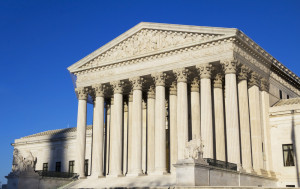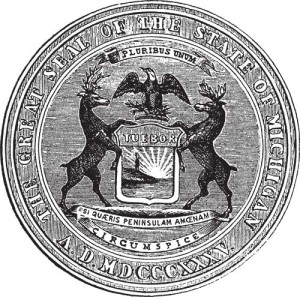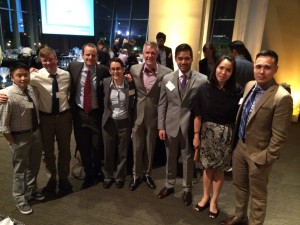Envtl. Prot. Agency v. EME Homer City Generation, L. P., United States Supreme Court (4/29/14)
Environmental Law, Government & Administrative Law
 The Clean Air Act (CAA) requires national ambient air quality standards (NAAQS) for pollutants at levels that will protect public health, 42 U.S.C. 7408. Once EPA establishes NAAQS, it designates “nonattainment” areas; each state must submit a State Implementation Plan, (SIP), within three years of any new or revised NAAQS. From the date EPA determines that a SIP is inadequate, EPA has two years to promulgate a Federal Implementation Plan (FIP). SIPs must comply with a Good Neighbor Provision, and “contain adequate provisions … prohibiting .. . any source or other type of emissions activity within the State from emitting any air pollutant in amounts which will … contribute significantly to nonattainment in, or interfere with maintenance by, any other State with respect to” NAAQS. In response to flaws in its 2005 Clean Air Interstate Rule, identified by the D. C. Circuit, EPA promulgated the Cross-State Air Pollution Rule (Transport Rule), curbing nitrogen oxide and sulfur dioxide emissions in 27 upwind states to achieve downwind attainment of three NAAQS and providing that an upwind state contributed significantly to downwind nonattainment if its exported pollution produced at least one percent of a NAAQS in a downwind state and could be eliminated cost-effectively. EPA created an annual emissions “budget” for each upwind state and contemporaneously promulgated FIPs allocating each state’s budget among its pollution sources. The D.C. Circuit vacated the rule as exceeding EPA’s authority. The Supreme Court reversed. The CAA does not require that states be given another opportunity to file a SIP after EPA has quantified interstate pollution obligations. Disapproval of a SIP, without more, triggers EPA’s obligation to issue a FIP within precise deadlines. That EPA had previously accorded upwind states a chance to allocate emission budgets among their sources does not show that it acted arbitrarily by refraining to do so in this instance. The Good Neighbor Provision does not dictate a method of apportionment, so EPA had authority to select from among reasonable options; nothing precludes the final calculation from relying on costs. By imposing uniform cost thresholds on regulated states, the rule is efficient and is stricter on states that have done less pollution control in the past and does not amount to “over-control.”
The Clean Air Act (CAA) requires national ambient air quality standards (NAAQS) for pollutants at levels that will protect public health, 42 U.S.C. 7408. Once EPA establishes NAAQS, it designates “nonattainment” areas; each state must submit a State Implementation Plan, (SIP), within three years of any new or revised NAAQS. From the date EPA determines that a SIP is inadequate, EPA has two years to promulgate a Federal Implementation Plan (FIP). SIPs must comply with a Good Neighbor Provision, and “contain adequate provisions … prohibiting .. . any source or other type of emissions activity within the State from emitting any air pollutant in amounts which will … contribute significantly to nonattainment in, or interfere with maintenance by, any other State with respect to” NAAQS. In response to flaws in its 2005 Clean Air Interstate Rule, identified by the D. C. Circuit, EPA promulgated the Cross-State Air Pollution Rule (Transport Rule), curbing nitrogen oxide and sulfur dioxide emissions in 27 upwind states to achieve downwind attainment of three NAAQS and providing that an upwind state contributed significantly to downwind nonattainment if its exported pollution produced at least one percent of a NAAQS in a downwind state and could be eliminated cost-effectively. EPA created an annual emissions “budget” for each upwind state and contemporaneously promulgated FIPs allocating each state’s budget among its pollution sources. The D.C. Circuit vacated the rule as exceeding EPA’s authority. The Supreme Court reversed. The CAA does not require that states be given another opportunity to file a SIP after EPA has quantified interstate pollution obligations. Disapproval of a SIP, without more, triggers EPA’s obligation to issue a FIP within precise deadlines. That EPA had previously accorded upwind states a chance to allocate emission budgets among their sources does not show that it acted arbitrarily by refraining to do so in this instance. The Good Neighbor Provision does not dictate a method of apportionment, so EPA had authority to select from among reasonable options; nothing precludes the final calculation from relying on costs. By imposing uniform cost thresholds on regulated states, the rule is efficient and is stricter on states that have done less pollution control in the past and does not amount to “over-control.”
Read More: Justices Back Rule Limiting Coal Pollution
Highmark, Inc. v. Allcare, United States Supreme Court (4/29/14)
Patents
The Patent Act provides: “The court in exceptional cases may award reasonable attorney fees to the prevailing party,” 35 U.S.C. 285. The Federal Circuit has interpreted section 285 as authorizing fee awards only “when there has been some material inappropriate conduct,” or when it is both “brought in subjective bad faith” and “objectively baseless.” A health insurance company obtained a declaratory judgment that a patent was invalid and not infringed. The district court found the case “exceptional” and awarded attorney fees of $4,694,727.40, $209,626.56 in expenses, and $375,400.05 in expert fees. The court found a pattern of “vexatious” and “deceitful” conduct by the defendant in attempting to force other companies to purchase licenses, even after its own experts determined that its claims lacked merit. The Federal Circuit reviewed the determination de novo and reversed in part. A unanimous Supreme Court vacated. All aspects of a district court’s exceptional-case determination should be reviewed for abuse of discretion. That determination is based on statutory text that emphasizes that the district court is better positioned to make the “multifarious and novel” determination, which is not susceptible to “useful generalization” of the sort that de novo review provides, and is “likely to profit from the experience that an abuse-of discretion rule will permit to develop.” The word “exceptional” should be given its ordinary meaning: “one that stands out from others with respect to the substantive strength of a party’s litigating position (considering both the governing law and the facts of the case) or the unreasonable manner in which the case was litigated,” considering the totality of the circumstances.
Octane Fitness, LLC v. ICON Health & Fitness, Inc., United States Supreme Court (4/29/14)
Patents
The Patent Act authorizes district courts to award attorney’s fees to prevailing parties in “exceptional cases,” 35 U.S.C. 285. In Brooks Furniture, the Federal Circuit defined an “exceptional case” as one which either involves “material inappropriate conduct” or is both “objectively baseless” and “brought in subjective bad faith” as shown by clear and convincing evidence. ICON sued Octane for patent infringement. The district court granted summary judgment to Octane, but denied attorney’s fees under section 285. The Federal Circuit affirmed. The Supreme Court reversed, finding the Brooks Furniture framework “unduly rigid’ in light of the statutory grant of discretion to district courts. Section 285 imposes only one constraint on the award of attorney’s fees, limiting it to “exceptional” cases. Because the Patent Act does not define “exceptional,” the term should be given it ordinary meaning: “uncommon,” “rare,” or “not ordinary.” An “exceptional” case is simply one that stands out from others with respect to the substantive strength of a party’s litigating position (considering both governing law and the facts) or the unreasonable manner in which the case was litigated. District courts may determine whether a case is “exceptional” in the case-by-case exercise of their discretion, considering the totality of the circumstances. The Brooks Furniture standard was so demanding that it appeared to render section 285 superfluous of the courts’ inherent power to award fees in cases involving misconduct or bad faith. Section 285 imposes no specific evidentiary burden.
Read More About These Two Decisions: Watch Out Trolls: Supreme Court Expands Fee Shifting in Patent Cases
 This week, a federal judge in the U.S. District Court for the Central District of California issued a ruling that California’s death penalty is unconstitutional. Read Courtney Minick’s analysis of the opinion on Justia’s Verdict: Federal Judge Strikes Down California Death Penalty: What This Could Mean for California.
This week, a federal judge in the U.S. District Court for the Central District of California issued a ruling that California’s death penalty is unconstitutional. Read Courtney Minick’s analysis of the opinion on Justia’s Verdict: Federal Judge Strikes Down California Death Penalty: What This Could Mean for California.
 Today, the U.S. Supreme Court handed down its
Today, the U.S. Supreme Court handed down its  Qualifying U.S. citizens and lawful permanent residents (LPRs) may petition for family members to obtain immigrant visas. A sponsored individual (principal beneficiary) is placed into a “family preference” category based on relationship to the petitioner, 8 U.S.C. 1153(a)(1)–(4). The principal beneficiary’s spouse and minor children qualify as derivative beneficiaries, entitled to the same status and order of consideration as the principal. Beneficiaries become eligible to apply for visas in order of priority date, the date a petition was filed. Because the process often takes years, a child may age out and lose status before she obtains a visa. The Child Status Protection Act (CSPA) provides that if the age of an alien is determined to be 21 years or older, notwithstanding allowances for bureaucratic delay, the petition “shall automatically be converted to the appropriate category and the alien shall retain the original priority date issued upon receipt of the original petition.” In this case, principal beneficiaries who became LPRs, filed petitions for their aged-out children (who did not have a qualifying relationship with the original sponsor), asserting that the newly filed petitions should receive the same priority date as their original petitions. U. S. Citizenship and Immigration Services (USCIS) disagreed. The district court granted the government summary judgment, deferring to the Board of Immigration Appeals’ (BIA’s) determination under section 1153(h)(3). The Ninth Circuit reversed, holding that the provision entitled all aged-out derivative beneficiaries to automatic conversion and priority date retention. The Supreme Court reversed, reasoning that each immigrant must have a qualified and willing sponsor. If an original sponsor does not have a legally recognized relationship with the aged-out children, another sponsor must be identified for the alien to qualify for a new family preference category. Immigration officials do not know whether a valid sponsor exists unless the aged-out beneficiary files and USCIS approves a new petition. Section 1153(h)(3) does not require a new petition for derivative beneficiaries who had a qualifying relationship with an LPR both before and after they aged out. In contrast, the nieces, nephews, and grandchildren of the initial sponsors cannot qualify for “automatic conversion.” The BIA’s interpretation benefits from administrative simplicity and fits with immigration law’s basic first-come, first-served rule.
Qualifying U.S. citizens and lawful permanent residents (LPRs) may petition for family members to obtain immigrant visas. A sponsored individual (principal beneficiary) is placed into a “family preference” category based on relationship to the petitioner, 8 U.S.C. 1153(a)(1)–(4). The principal beneficiary’s spouse and minor children qualify as derivative beneficiaries, entitled to the same status and order of consideration as the principal. Beneficiaries become eligible to apply for visas in order of priority date, the date a petition was filed. Because the process often takes years, a child may age out and lose status before she obtains a visa. The Child Status Protection Act (CSPA) provides that if the age of an alien is determined to be 21 years or older, notwithstanding allowances for bureaucratic delay, the petition “shall automatically be converted to the appropriate category and the alien shall retain the original priority date issued upon receipt of the original petition.” In this case, principal beneficiaries who became LPRs, filed petitions for their aged-out children (who did not have a qualifying relationship with the original sponsor), asserting that the newly filed petitions should receive the same priority date as their original petitions. U. S. Citizenship and Immigration Services (USCIS) disagreed. The district court granted the government summary judgment, deferring to the Board of Immigration Appeals’ (BIA’s) determination under section 1153(h)(3). The Ninth Circuit reversed, holding that the provision entitled all aged-out derivative beneficiaries to automatic conversion and priority date retention. The Supreme Court reversed, reasoning that each immigrant must have a qualified and willing sponsor. If an original sponsor does not have a legally recognized relationship with the aged-out children, another sponsor must be identified for the alien to qualify for a new family preference category. Immigration officials do not know whether a valid sponsor exists unless the aged-out beneficiary files and USCIS approves a new petition. Section 1153(h)(3) does not require a new petition for derivative beneficiaries who had a qualifying relationship with an LPR both before and after they aged out. In contrast, the nieces, nephews, and grandchildren of the initial sponsors cannot qualify for “automatic conversion.” The BIA’s interpretation benefits from administrative simplicity and fits with immigration law’s basic first-come, first-served rule. Plaintiff-appellant Matthew Makowski filed an action in the Court of Claims against the Governor and the Secretary of State, seeking a declaratory judgment and injunctive relief to reverse then-Governor Jennifer Granholm’s decision to revoke her commutation of plaintiff’s nonparolable life sentence that had been imposed for his first-degree murder and armed robbery convictions. The Governor had signed the commutation, it was signed by the Secretary of State and affixed with the Great Seal. Four days later, the Governor decided to revoke the order, and all copies of the commutation certificate were destroyed. Plaintiff alleged that the commutation was final when it was signed, sealed, and delivered to the Department of Corrections, and argued the Governor lacked the authority to revoke a completed commutation. The court granted defendants’ motion for summary judgment, concluding that it lacked jurisdiction to review the governor’s exercise of discretion over commutation decisions. Plaintiff appealed. The Court of Appeals affirmed, holding that the Governor’s exercise of the commutation power presented a nonjusticiable political question. After its review, the Supreme Court concluded the Constitution did not give the Governor the power to revoke a validly granted commutation: “[b]ecause the Governor signed plaintiff’s commutation and delivered it to the Secretary of State, where it was signed and affixed with the Great Seal, plaintiff was granted an irrevocable commutation of his sentence.”
Plaintiff-appellant Matthew Makowski filed an action in the Court of Claims against the Governor and the Secretary of State, seeking a declaratory judgment and injunctive relief to reverse then-Governor Jennifer Granholm’s decision to revoke her commutation of plaintiff’s nonparolable life sentence that had been imposed for his first-degree murder and armed robbery convictions. The Governor had signed the commutation, it was signed by the Secretary of State and affixed with the Great Seal. Four days later, the Governor decided to revoke the order, and all copies of the commutation certificate were destroyed. Plaintiff alleged that the commutation was final when it was signed, sealed, and delivered to the Department of Corrections, and argued the Governor lacked the authority to revoke a completed commutation. The court granted defendants’ motion for summary judgment, concluding that it lacked jurisdiction to review the governor’s exercise of discretion over commutation decisions. Plaintiff appealed. The Court of Appeals affirmed, holding that the Governor’s exercise of the commutation power presented a nonjusticiable political question. After its review, the Supreme Court concluded the Constitution did not give the Governor the power to revoke a validly granted commutation: “[b]ecause the Governor signed plaintiff’s commutation and delivered it to the Secretary of State, where it was signed and affixed with the Great Seal, plaintiff was granted an irrevocable commutation of his sentence.” A bicyclist was attacked by two ranch dogs herding sheep while participating in a mountain bike race. The cyclist and dogs were on federally owned land on which the attack took place, subject to a sheep grazing permit and a recreational use permit. The cyclist sustained serious injuries during the attack. The cyclist and her husband sued the dog’s owners, alleging negligence, negligence per se and loss of consortium. They also brought a strict liability claim under Colorado’s dog bite statute. The shepherds moved for summary judgment, arguing that: (1) the Colorado Premises Liability Act preempted the cyclist’s common law claims; and (2) they were immune from strict liability under the working-dog exemption to the dog bite statute. The district court granted the shepherds’ motion. The court of appeals reversed, interpreting the working dog exemption as applicable only when the dog is on the owner’s own property. The Supreme Court disagreed and reversed the appellate court: the exemption applied when a dog bite occurs on the dog owner’s property or when the dog is working under the control of the dog owner.
A bicyclist was attacked by two ranch dogs herding sheep while participating in a mountain bike race. The cyclist and dogs were on federally owned land on which the attack took place, subject to a sheep grazing permit and a recreational use permit. The cyclist sustained serious injuries during the attack. The cyclist and her husband sued the dog’s owners, alleging negligence, negligence per se and loss of consortium. They also brought a strict liability claim under Colorado’s dog bite statute. The shepherds moved for summary judgment, arguing that: (1) the Colorado Premises Liability Act preempted the cyclist’s common law claims; and (2) they were immune from strict liability under the working-dog exemption to the dog bite statute. The district court granted the shepherds’ motion. The court of appeals reversed, interpreting the working dog exemption as applicable only when the dog is on the owner’s own property. The Supreme Court disagreed and reversed the appellate court: the exemption applied when a dog bite occurs on the dog owner’s property or when the dog is working under the control of the dog owner. The Copyright Act protects works published before 1978 for 28 years, renewable for up to 67 years, 17 U.S.C. 304(a). An author’s heirs inherit renewal rights. If an author who has assigned rights dies before the renewal period the assignee may continue to use the work only if the author’s successor transfers renewal rights to the assignee. The Act provides for injunctive relief and damages. Civil actions must be commenced within three years after the claim accrued-ordinarily when an infringing act occurred. Under the separate-accrual rule, each successive violation starts a new limitations period, but is actionable only within three years of its occurrence. The movie, Raging Bull, is based on the life of boxer Jake LaMotta, who, with Petrella, told his story in a screenplay copyrighted in 1963. In 1976 they assigned their rights and renewal rights to MGM. In 1980 MGM released, and registered a copyright in, Raging Bull. Petrella died during the initial copyright term, so renewal rights reverted to his daughter, who renewed the 1963 copyright in 1991. Seven years later, she advised MGM that it was violating her copyright. Nine years later she filed suit, seeking damages and injunctive relief for violations occurring after January 5, 2006. The district court dismissed, citing laches. The Ninth Circuit affirmed. The Supreme Court reversed. Laches cannot bar a claim for damages brought within the three-year window. By permitting retrospective relief only three years back, the limitations period takes account of delay. Noting the “essentially gap-filling, not legislation-overriding,” nature of laches, the Court stated that it has never applied laches to entirely bar claims for discrete wrongs occurring within a federally prescribed limitations period. It is not incumbent on copyright owners to challenge every actionable infringement; there is nothing untoward about waiting to see whether a violation undercuts the value of the copyrighted work, has no effect, or even complements the work. The limitations period, with the separate-accrual rule, allows an owner to defer suit until she can estimate whether litigation is worth the effort. Because a plaintiff bears the burden of proof, evidence unavailability is as likely to affect plaintiffs as defendants. The Court noted that in some circumstances, the equitable defense of estoppel might limit remedies. Allowing this suit to proceed will put at risk only a fraction of what MGM has earned from Raging Bull and will work no unjust hardship on innocent third parties. Should Petrella prevail on the merits, the court may fashion a remedy taking account of the delay and MGM’s alleged reliance on that delay.
The Copyright Act protects works published before 1978 for 28 years, renewable for up to 67 years, 17 U.S.C. 304(a). An author’s heirs inherit renewal rights. If an author who has assigned rights dies before the renewal period the assignee may continue to use the work only if the author’s successor transfers renewal rights to the assignee. The Act provides for injunctive relief and damages. Civil actions must be commenced within three years after the claim accrued-ordinarily when an infringing act occurred. Under the separate-accrual rule, each successive violation starts a new limitations period, but is actionable only within three years of its occurrence. The movie, Raging Bull, is based on the life of boxer Jake LaMotta, who, with Petrella, told his story in a screenplay copyrighted in 1963. In 1976 they assigned their rights and renewal rights to MGM. In 1980 MGM released, and registered a copyright in, Raging Bull. Petrella died during the initial copyright term, so renewal rights reverted to his daughter, who renewed the 1963 copyright in 1991. Seven years later, she advised MGM that it was violating her copyright. Nine years later she filed suit, seeking damages and injunctive relief for violations occurring after January 5, 2006. The district court dismissed, citing laches. The Ninth Circuit affirmed. The Supreme Court reversed. Laches cannot bar a claim for damages brought within the three-year window. By permitting retrospective relief only three years back, the limitations period takes account of delay. Noting the “essentially gap-filling, not legislation-overriding,” nature of laches, the Court stated that it has never applied laches to entirely bar claims for discrete wrongs occurring within a federally prescribed limitations period. It is not incumbent on copyright owners to challenge every actionable infringement; there is nothing untoward about waiting to see whether a violation undercuts the value of the copyrighted work, has no effect, or even complements the work. The limitations period, with the separate-accrual rule, allows an owner to defer suit until she can estimate whether litigation is worth the effort. Because a plaintiff bears the burden of proof, evidence unavailability is as likely to affect plaintiffs as defendants. The Court noted that in some circumstances, the equitable defense of estoppel might limit remedies. Allowing this suit to proceed will put at risk only a fraction of what MGM has earned from Raging Bull and will work no unjust hardship on innocent third parties. Should Petrella prevail on the merits, the court may fashion a remedy taking account of the delay and MGM’s alleged reliance on that delay. Raymone Bain and her firm filed suit against Michael Jackson and his production company, MJJ Productions, Inc., claiming to be owed substantial sums for various services rendered. Defendants moved to dismiss, relying principally on a December 2007 release agreement where Bain broadly relinquished any claims against Jackson and his business entities. The district court granted summary judgment in favor of MJJ, holding that the release agreement precluded Bain’s claims. Bain moved for relief from judgment under Rule 60(b)(2) five months later. The “newly discovered evidence” cited by Bain was an April 2008 letter from Jackson to Bain, in which Jackson stated that he had no awareness of, and had never signed, the release agreement on which the district court had grounded its grant of summary judgment. The district court held that a movant’s awareness of evidence automatically precludes relief under Rule 60(b)(2), regardless of the evidence’s availability. The court found that to be an unduly constricted understanding of “newly discovered evidence” for purposes of Rule 60(b)(2). The court concluded, however, that the district court committed no abuse of discretion by looking beyond Bain’s efforts in searching her own files and considering whether she mentioned the letter to the court or sought its assistance in locating the evidence. Because Bain failed to exercise reasonable diligence in seeking out the letter, the court affirmed the judgment of the district court.
Raymone Bain and her firm filed suit against Michael Jackson and his production company, MJJ Productions, Inc., claiming to be owed substantial sums for various services rendered. Defendants moved to dismiss, relying principally on a December 2007 release agreement where Bain broadly relinquished any claims against Jackson and his business entities. The district court granted summary judgment in favor of MJJ, holding that the release agreement precluded Bain’s claims. Bain moved for relief from judgment under Rule 60(b)(2) five months later. The “newly discovered evidence” cited by Bain was an April 2008 letter from Jackson to Bain, in which Jackson stated that he had no awareness of, and had never signed, the release agreement on which the district court had grounded its grant of summary judgment. The district court held that a movant’s awareness of evidence automatically precludes relief under Rule 60(b)(2), regardless of the evidence’s availability. The court found that to be an unduly constricted understanding of “newly discovered evidence” for purposes of Rule 60(b)(2). The court concluded, however, that the district court committed no abuse of discretion by looking beyond Bain’s efforts in searching her own files and considering whether she mentioned the letter to the court or sought its assistance in locating the evidence. Because Bain failed to exercise reasonable diligence in seeking out the letter, the court affirmed the judgment of the district court. Since 1999, Greece, New York has opened monthly town board meetings with a roll call, recitation of the Pledge of Allegiance, and a prayer by a local clergy member. While the prayer program is open to all creeds, nearly all local congregations are Christian. Citizens alleged violation of the First Amendment’s Establishment Clause by preferring Christians over other prayer givers and by sponsoring sectarian prayers and sought to limit the town to “inclusive and ecumenical” prayers that referred only to a “generic God.” The district court entered summary judgment upholding the prayer practice. The Second Circuit reversed, holding that some aspects of the prayer program, viewed in their totality by a reasonable observer, conveyed the message that the town endorsed Christianity. A divided Supreme Court reversed, upholding the town’s practice. Legislative prayer, while religious in nature, has long been understood as compatible with the Establishment Clause. Most states have also had a practice of legislative prayer and there is historical precedent for opening local legislative meetings with prayer. Any test of such a practice must acknowledge that it was accepted by the Framers and has withstood the scrutiny of time and political change. The inquiry is whether the town of Greece’s practice fits within that tradition. To hold that invocations must be nonsectarian would force legislatures sponsoring prayers and courts deciding these cases to act as censors of religious speech, thus involving government in religious matters to a greater degree than under the town’s current practice of neither editing nor approving prayers in advance nor criticizing their content after the fact. It is doubtful that consensus could be reached as to what qualifies as a generic or nonsectarian prayer. The First Amendment is not a “majority rule” and government may not seek to define permissible categories of religious speech. The relevant constraint derives from the prayer’s place at the opening of legislative sessions, where it is meant to lend gravity and reflect values long part of the Nation’s heritage. Absent a pattern of prayers that over time denigrate, proselytize, or betray an impermissible government purpose, a challenge based only on the content of a particular prayer will not likely establish a constitutional violation. If the town maintains a policy of nondiscrimination, the Constitution does not require it to search beyond its borders for non-Christian prayer givers to achieve religious balance.
Since 1999, Greece, New York has opened monthly town board meetings with a roll call, recitation of the Pledge of Allegiance, and a prayer by a local clergy member. While the prayer program is open to all creeds, nearly all local congregations are Christian. Citizens alleged violation of the First Amendment’s Establishment Clause by preferring Christians over other prayer givers and by sponsoring sectarian prayers and sought to limit the town to “inclusive and ecumenical” prayers that referred only to a “generic God.” The district court entered summary judgment upholding the prayer practice. The Second Circuit reversed, holding that some aspects of the prayer program, viewed in their totality by a reasonable observer, conveyed the message that the town endorsed Christianity. A divided Supreme Court reversed, upholding the town’s practice. Legislative prayer, while religious in nature, has long been understood as compatible with the Establishment Clause. Most states have also had a practice of legislative prayer and there is historical precedent for opening local legislative meetings with prayer. Any test of such a practice must acknowledge that it was accepted by the Framers and has withstood the scrutiny of time and political change. The inquiry is whether the town of Greece’s practice fits within that tradition. To hold that invocations must be nonsectarian would force legislatures sponsoring prayers and courts deciding these cases to act as censors of religious speech, thus involving government in religious matters to a greater degree than under the town’s current practice of neither editing nor approving prayers in advance nor criticizing their content after the fact. It is doubtful that consensus could be reached as to what qualifies as a generic or nonsectarian prayer. The First Amendment is not a “majority rule” and government may not seek to define permissible categories of religious speech. The relevant constraint derives from the prayer’s place at the opening of legislative sessions, where it is meant to lend gravity and reflect values long part of the Nation’s heritage. Absent a pattern of prayers that over time denigrate, proselytize, or betray an impermissible government purpose, a challenge based only on the content of a particular prayer will not likely establish a constitutional violation. If the town maintains a policy of nondiscrimination, the Constitution does not require it to search beyond its borders for non-Christian prayer givers to achieve religious balance.
 The Clean Air Act (CAA) requires national ambient air quality standards (NAAQS) for pollutants at levels that will protect public health, 42 U.S.C. 7408. Once EPA establishes NAAQS, it designates “nonattainment” areas; each state must submit a State Implementation Plan, (SIP), within three years of any new or revised NAAQS. From the date EPA determines that a SIP is inadequate, EPA has two years to promulgate a Federal Implementation Plan (FIP). SIPs must comply with a Good Neighbor Provision, and “contain adequate provisions … prohibiting .. . any source or other type of emissions activity within the State from emitting any air pollutant in amounts which will … contribute significantly to nonattainment in, or interfere with maintenance by, any other State with respect to” NAAQS. In response to flaws in its 2005 Clean Air Interstate Rule, identified by the D. C. Circuit, EPA promulgated the Cross-State Air Pollution Rule (Transport Rule), curbing nitrogen oxide and sulfur dioxide emissions in 27 upwind states to achieve downwind attainment of three NAAQS and providing that an upwind state contributed significantly to downwind nonattainment if its exported pollution produced at least one percent of a NAAQS in a downwind state and could be eliminated cost-effectively. EPA created an annual emissions “budget” for each upwind state and contemporaneously promulgated FIPs allocating each state’s budget among its pollution sources. The D.C. Circuit vacated the rule as exceeding EPA’s authority. The Supreme Court reversed. The CAA does not require that states be given another opportunity to file a SIP after EPA has quantified interstate pollution obligations. Disapproval of a SIP, without more, triggers EPA’s obligation to issue a FIP within precise deadlines. That EPA had previously accorded upwind states a chance to allocate emission budgets among their sources does not show that it acted arbitrarily by refraining to do so in this instance. The Good Neighbor Provision does not dictate a method of apportionment, so EPA had authority to select from among reasonable options; nothing precludes the final calculation from relying on costs. By imposing uniform cost thresholds on regulated states, the rule is efficient and is stricter on states that have done less pollution control in the past and does not amount to “over-control.”
The Clean Air Act (CAA) requires national ambient air quality standards (NAAQS) for pollutants at levels that will protect public health, 42 U.S.C. 7408. Once EPA establishes NAAQS, it designates “nonattainment” areas; each state must submit a State Implementation Plan, (SIP), within three years of any new or revised NAAQS. From the date EPA determines that a SIP is inadequate, EPA has two years to promulgate a Federal Implementation Plan (FIP). SIPs must comply with a Good Neighbor Provision, and “contain adequate provisions … prohibiting .. . any source or other type of emissions activity within the State from emitting any air pollutant in amounts which will … contribute significantly to nonattainment in, or interfere with maintenance by, any other State with respect to” NAAQS. In response to flaws in its 2005 Clean Air Interstate Rule, identified by the D. C. Circuit, EPA promulgated the Cross-State Air Pollution Rule (Transport Rule), curbing nitrogen oxide and sulfur dioxide emissions in 27 upwind states to achieve downwind attainment of three NAAQS and providing that an upwind state contributed significantly to downwind nonattainment if its exported pollution produced at least one percent of a NAAQS in a downwind state and could be eliminated cost-effectively. EPA created an annual emissions “budget” for each upwind state and contemporaneously promulgated FIPs allocating each state’s budget among its pollution sources. The D.C. Circuit vacated the rule as exceeding EPA’s authority. The Supreme Court reversed. The CAA does not require that states be given another opportunity to file a SIP after EPA has quantified interstate pollution obligations. Disapproval of a SIP, without more, triggers EPA’s obligation to issue a FIP within precise deadlines. That EPA had previously accorded upwind states a chance to allocate emission budgets among their sources does not show that it acted arbitrarily by refraining to do so in this instance. The Good Neighbor Provision does not dictate a method of apportionment, so EPA had authority to select from among reasonable options; nothing precludes the final calculation from relying on costs. By imposing uniform cost thresholds on regulated states, the rule is efficient and is stricter on states that have done less pollution control in the past and does not amount to “over-control.”